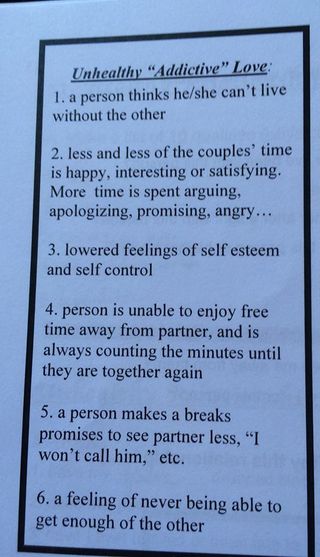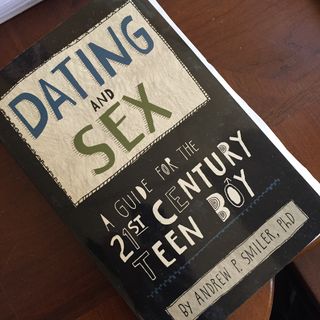Sex
Repairing the Damage of Abstinence-Based Sex Education
Only good, holistic, real world sex ed can help teens today
Posted August 17, 2016
For decades, the majority of sex education provided to adolescents in the US has focused on encouraging young people to refrain from sex. Our country has taken the approach that it is young people’s moral obligation to not engage in sex until they are adults. Further, it is the obligation of adults, governments, parents, leaders and teachers, to make sure that teens “Just Say No.” Even programs that aren't "abstinence-only" typically promote abstinence as the best strategy.

In July 2016, the American Academy of Pediatrics recommended to its nationwide membership, that they must educate children and teens about sex. They joined countless other groups of experts, physicians, and educators, all of whom oppose abstinence-based education. Teaching kids that abstinence is the best policy may serve moral concerns about adolescent sexuality but sadly puts these teens at great risk for sexual problems, and increased chances of unsafe sex.
In February, 2016, President Obama ended all federal funding for abstinence only education. Unfortunately, many states still promote this in their statewide curricula. I’ve talked to educators around the country about this, and they point out that they are between a rock and a hard place. Because our society has been taught to fear and shame teen sexuality, educators face angry parents and community leaders if they are seen to present anything other than a “Just Say No” model. Just Say No started with drugs, then spread to sex education. It didn't work effectively in either setting.
I live in New Mexico, a state where comprehensive sex education has been a law on the books for several years. But this year, my teenage daughter brought home materials from her own sex education course. It contained wildly inaccurate, shaming and fear-based statements, such as “Pornography warning: it’s not possible to discuss sex crimes and not mention pornography;” “Pornography is just as addicting as any narcotic drug (like Heroin and Oxycodone;” and presented disturbing and unscientific ideas around “Addictive” love. Sadly, a minority of states in the country require that sex education provided to adolescents be medically accurate. In 2015, writer Alice Dreger live-tweeted her experience of sitting through her son's sex education class, to hilarious, viral, and disturbing results.

Right now, when teens can’t get answers to their questions and interest in sex, they go to the easily accessible resource of online porn. Across the world, communities are concerned about this. And they should be. Teens learn bad habits and worse expectations about sex from the fantasy sex depicted in porn. It’s no wonder that young men who learned about sex from watching porn are struggling with things like erectile dysfunction – it’s not that porn has caused erectile dysfunction, but is because porn teaches that men always have long-lasting erections and when a young man experiences something different, he’s not prepared to understand that it’s normal.
We don’t let kids learn to drive by watching movies like "The Fast and the Furious" – if we did, many would die in flaming car wrecks. Sadly, we are still allowing kids to learn about sex from the adult fantasy of porn, without an adequate understanding of what real sex is. People, even teens, have the ability to distinguish from reality, when they have an idea what reality is. But when kids have no pragmatic, real-world understanding of what sex is, because sex education provided today has no connection to the modern world of sex, these young people can’t understand that sex involves integrity, communication, personal awareness, and respect, as much or more than it requires genitalia.
To address these issues, we need more information out there for teens, to counteract the fear and shame and lack of accurate information which has been promoted by abstinence-only models for so many years. Frankly, I believe that the United states must expect decades of sexual dysfunctions, relationship conflicts, and sexual conflicts, as we deal with the lingering effects of abstinence-based sex education.

The American Psychological Association recently published a new book by developmental psychologist Andrew Smiler. Smiler has specialized in working with male sexuality issues, and with teen boys, and his work brings a pragmatic, grounded and holistic view of sex to the fore. Dating and Sex: A Guide for the 21st Century Teen Boy is a wonderful resource, for teens, educators and parents. It coves issues ranging from how to ask a person out to how to break up, how to put on a condom correctly, and even how to know whether your penis is the “right” size. There is a wonderful section on consent, a critical issue in today’s world, where high school and college issues of consent are ruining peoples’ lives. Smiler recognizes that it’s hard to be a teen today, in a world flooded with both sexual stimulation and sexual anxiety. He sees boys who fear that their bodies aren’t as muscular as those of men in superhero movies, and he helps boys who fear that their sexual desires are unusual and uncommon. If I were a teen boy today, I would devour this book.
I first met Smiler through our common friendship with Laci Green, Youtube sensation and sex educator. As I train therapists around the country, I show videos of Green – few therapists know who she is. "But," I tell them, "your teen patients do know her." Green is a young person dedicated to providing effective, accurate, but most of all, real-world, sex and relationship advice to teens today, to counteract the damage of abstinence-based sex education that relies on fear and shame to try to control teen sexuality. Her videos get millions upon millions of viewers.
Finally, Scarleteen is an extraordinary online resource for teens, with bulletin boards, videos, information and special sections for girls, boys and even trans-identified teens. It is based on the idea that teens deserve sex ed, “for the real world,” and it addresses the questions we might wish teens didn’t have, but do.
In order to help our young people build healthy lives, and have pleasurable, safe, consensual and healthy sexual relationships, we MUST begin to address the damages and deficits created by morally-driven, fear-based sex education strategies. Personally and professionally, I believe that most teens ARE able to make good, healthy decisions about sexual matters, when they are given the resources and education to understand those decisions. Fear and shame make healthy decisions less likely, and make problematic behaviors harder to change. Now, it’s our obligation to correct course, and ensure that teens receive the information and support they need, to be healthy in their lives and sexuality.




